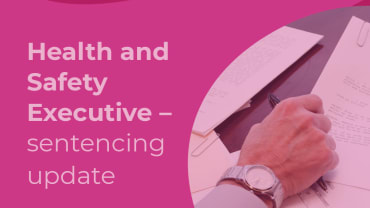At the moment, many businesses in the UK are preparing to reopen as social distancing rules are relaxed.
This is a positive step but businesses should be mindful of the health and safety risks arising from unoccupied or reduced occupancy premises. These risks must be assessed before premises can be safely reoccupied.
As reported in the media lately; one of those risks is the potentially fatal illness Legionnaires’ disease which is caused by water system stagnation. Here we discuss the risks posed by the disease and the duties on building occupiers.
Legionnaires’ disease and legionella
Legionnaires’ disease is a lung infection, caused by inhaling small droplets of water, suspended in the air, which contain legionella bacteria. It is rarely transferred between people and can be treated with antibiotics. Symptoms include a high temperature or fever, a cough, along with muscle pains, a headache and sometimes pneumonia.
Legionella is commonly found in places such as purpose-built water systems, cooling towers, evaporative condensers, hot and cold water systems and spa pools. There are also a number of other systems where legionella may be found e.g. humidifiers, air washers, emergency showers, indoor ornamental fountains etc.
Why is there an increased risk due to lockdown?
Back in March 2020, many premises were shut without sufficient time to consider safety issues such as water hygiene. Although some businesses may have been able to control the risks of legionella by arranging for staff to flush water systems periodically and to empty tanks; for many that will not have been feasible.
According to water hygiene experts, out of use water systems provide favourable conditions for the growth of legionella bacteria. When the premises are re-occupied and water systems are used, the bacteria are then released into the atmosphere contained in the tiny water droplets from taps, showers, toilets etc.
Legal Duties
Although there are no specific laws relating to control of legionella (such as those in relation to asbestos and lead, for example) the overarching legal duties on duty holders (employers, the self-employed and people in control of premises, such as landlords) impose a duty to take steps to reduce the risk posed by legionella. The HSE and others have produced useful advice in relation to the assessment and control of the risks.
As premises prepare to open, duty holders are likely to be assumed to have knowledge of the risks and will therefore be in breach of their duties if they fail to follow advice.
Sources of advice and guidance for duty holders
- The Legionella Control Association (LCA) has made the following statement on the issue: “Simply reopening a building that has stood idle, without addressing the safety of its water system, is unacceptable and is likely to be in breach of the law. If duty holders are not able to put in place a proper recommissioning process to use the water system safely, they should not reopen the building.” The LCA’s guidance for reopening buildings can be found here.
- The Charted Institute of Environmental Health has issued Legionnaires’ disease: lockdown risks and reopening safely.
- The Health and Safety Executive (HSE) advises that if the premises were closed or had reduced occupancy during lockdown, the duty holder should review its risk assessment and manage the legionella risks when they:
- reinstate a water system or start using it again
- restart some types of air conditioning units
The HSE has issued guidance for controlling legionella in different types of water systems.
- The risk assessment must meet certain standards; the British Standards Institute has published a standard for legionella risk assessment.
Legionella risk assessment – key points
- Duty holders can carry out the legionella risk assessment if they are competent or they can use an independent contractor. The duty holder must make reasonable checks to ensure the competence of the person appointed. They may also contact their local council for advice.
- If an employer has five or more employees, it must record any record any significant findings, including any groups of employees identified by it as being particularly at risk and the steps taken to prevent or control risks.
- High risk individuals may include those who have had the COVID-19 virus as their respiratory systems may be compromised and they may be more susceptible to Legionnaires’ disease.
COVID-19 or Legionnaires’ disease?
Finally, employers should bear in mind that if an employee reports suspected COVID-19 symptoms when returning to work; it could in fact be Legionnaires’ disease as the symptoms of the diseases are very similar.
Contributor
Legal Director











